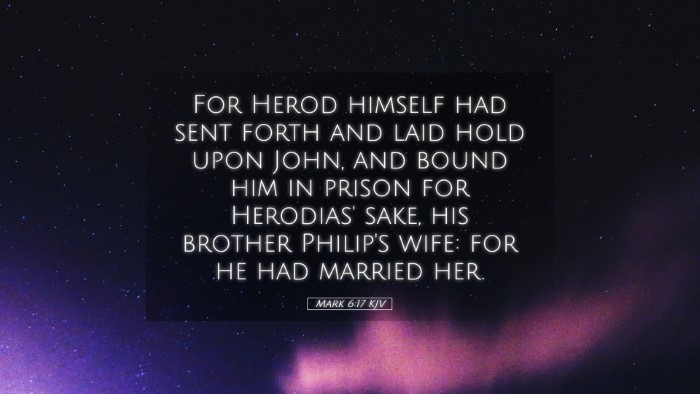Commentary on Mark 6:17
Mark 6:17 states: 'For Herod himself had sent forth and laid hold upon John, and bound him in prison for Herodias' sake, his brother Philip's wife: for he had married her.' This verse encapsulates critical events surrounding the life and ministry of John the Baptist, offering profound insights into the interplay of power, morality, and the prophetic voice in the context of biblical history.
Contextual Analysis
Understanding this verse requires an exploration of its context, both immediate and broader within the Gospel narrative and historical backdrop.
- Historical Context: Herod Antipas, the ruler at this time, was known for his tumultuous reign and political machinations. His marriage to Herodias, who was his brother Philip's wife, was both scandalous and condemned, particularly by John the Baptist.
- John the Baptist's Role: John stands as a pivotal figure who dared to speak truth to power. His bold declaration against Herod's illicit marriage exemplifies the prophet’s duty to proclaim God's moral standards, regardless of the personal cost.
Thematic Insights
This passage raises themes of authority, morality, and the consequences of sin, which resonate profoundly through the Old and New Testaments.
- The Nature of Authority: Herod’s authority was temporal and politically granted, yet he wielded it violently against a man of God. This reflects the often-perverted nature of earthly authority, where personal vendettas can overshadow divine mandates.
- Prophetic Voice vs. Political Power: John’s imprisonment signifies the conflict that arises when prophetic truth confronts societal norms and abuses of power. The fear of retribution often silences voices that challenge wrongdoing.
- Moral Integrity: John’s unwavering stand on moral issues serves as an example for believers today, motivating them to engage in ethical discourse in challenging environments.
Commentary from Public Domain Sources
The insights of notable biblical scholars such as Matthew Henry, Albert Barnes, and Adam Clarke provide depth to the understanding of this passage.
Matthew Henry
Matthew Henry emphasizes the dangerous implications of Herod's actions, stating that Herod was moved by his unlawful desires and subjected John to imprisonment. He notes that John's imprisonment serves as an indicator of the prophetic ministry's perilous position in a world often hostile to truth. Henry points out that Herod sought to silence John, reflecting how the world's powerful often react against truth-tellers.
Albert Barnes
Albert Barnes focuses on the moral and ethical dimensions surrounding Herod's marriage to Herodias. He articulates that John’s condemnation was not merely personal but derived from a divine standard of righteousness that remains relevant. Barnes highlights the reasons behind John’s downfall—his faithful proclamation of God’s law, which, though just, put him at odds with Herod's desires. This tension illustrates the broader theme of the cost of discipleship in the face of injustice.
Adam Clarke
Adam Clarke provides insights into the political dynamics of the time, noting that Herod's marriage was seen as scandalous by Jewish society, thus bringing John’s rebuke into a broader social discourse. Clarke delves into the societal implications of John's ministry, arguing that his boldness was grounded in a conviction that truth must prevail over treachery. Clarke also remarks on the ironic twist that the very power Herod wielded to silence the truth ultimately defined his legacy through the martyrdom of John the Baptist.
Theological Reflections
This passage invites deeper theological reflections concerning the nature of holiness and the fate of prophets.
- Holiness in Confrontation: John exemplifies a life of holiness that stands against the tide of moral decay, suggesting that genuine faith requires a courageous witness.
- The Role of Suffering: John’s imprisonment and subsequent martyrdom serve as poignant reminders for believers that suffering for the sake of truth is a significant part of the Christian experience.
- God's Sovereignty: Ultimately, this passage underscores the sovereignty of God in the face of human opposition, positing that the silencing of prophetic voices may appear successful temporally but will not thwart God’s redemptive plan.
Application for Modern Believers
The story of John the Baptist holds a significant mirror to contemporary faith practices. Believers are called to engage actively with issues of moral integrity within their communities, advocating for truth and righteousness even in the face of opposition.
- Speaking Truth: Followers of Christ are called to be voices of truth in a world rife with moral ambiguity. This requires both courage and wisdom.
- Embracing Suffering: Understanding that suffering for the faith can lead to empowerment, expecting that their ministry might face challenges similar to John's.
- Advocacy for Justice: Engaging in social justice issues, reflecting the justice of God in the public square, much like John did in his own context.
Conclusion
Mark 6:17 not only recounts a historical event but encapsulates ongoing theological discussions and challenges for believers today. The interplay between Herod and John invites reflection on the nature of authority, the cost of discipleship, and the call to live out one's faith in complex societal dynamics. By examining the insights from esteemed commentaries, modern readers can glean wisdom applicable to their context, encouraging them to uphold truth in a world that often appears hostile to it.


